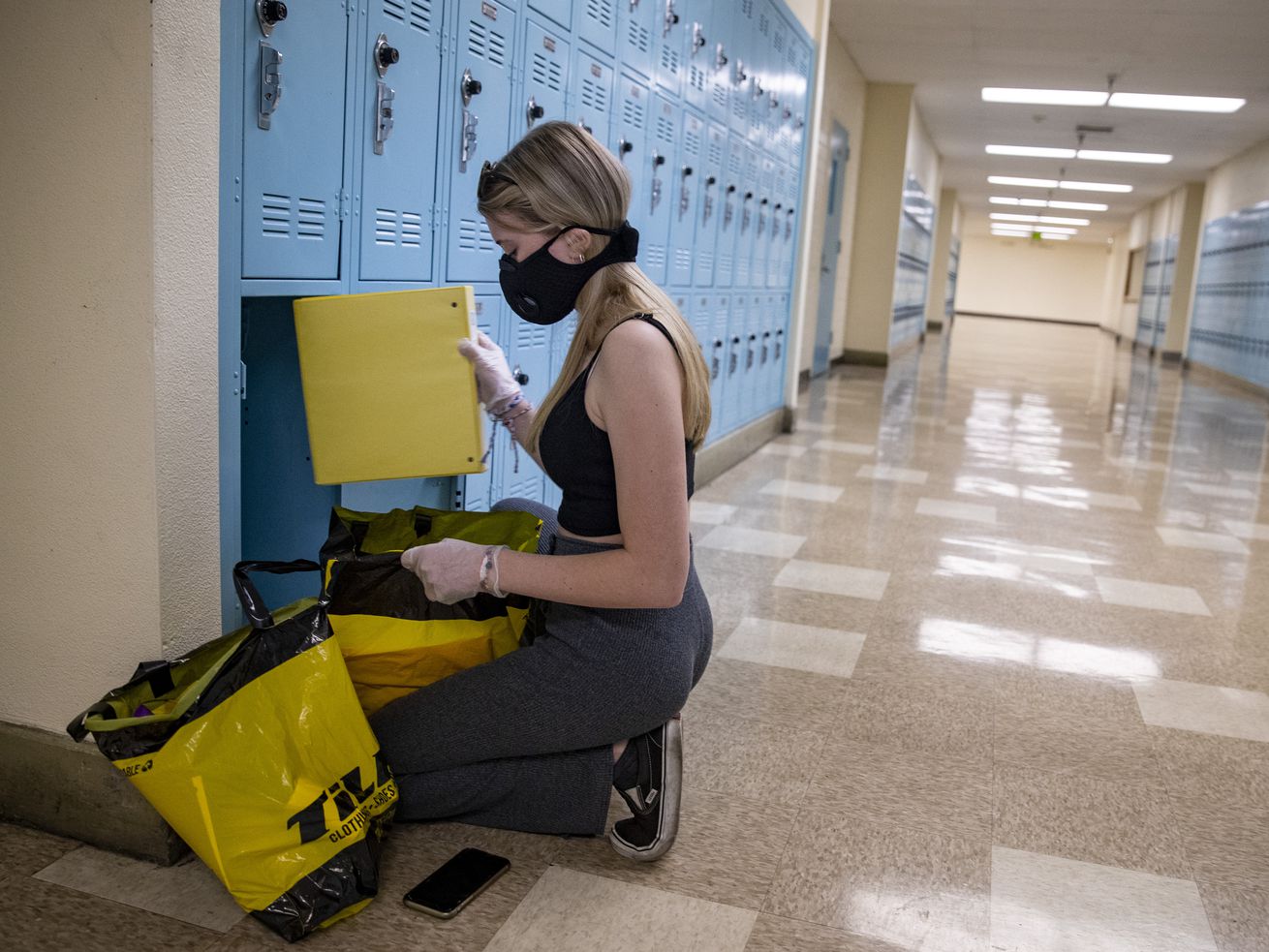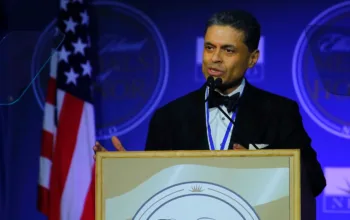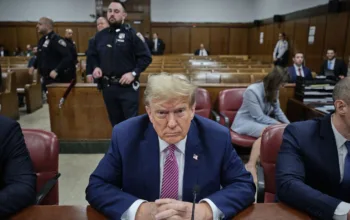Mass indifference is one big factor.
For the third summer in a row, school leaders are facing the question of what — if anything — they’re going to do to stop the spread of Covid-19 when students return to classrooms.
One thing is clear: Almost none of them will be requiring vaccines.
Just 31 percent of children between 5 and 11 in the US have been fully vaccinated, and 61 percent of 12- to 17-year-olds have been. (Only about 3 percent of children under 5 had received a first dose by July 20.)
Still, no state in the country is planning to require student vaccinations, a marked turnaround from where things seemed to be headed last winter, when multiple states and school districts suggested vaccine mandates were coming soon. Only Washington, DC, has announced a mandatory school vaccine policy this fall, for students 12 and older.
Other mitigation measures — from masks to ventilation — may also be on their way out. The Centers for Disease Control and Prevention will likely soon recommend easing school testing, quarantine, and social distancing requirements, CNN reported last week. (Many schools often disregarded CDC guidelines, but the update is a sign of how expectations have shifted.)
Burbio, a company that specializes in aggregating school calendars, reported that so far, the vast majority of school districts it tracks nationwide will not be requiring masks this fall. And a June CDC study found just under 40 percent of American public schools had replaced or upgraded their HVAC systems to provide improved ventilation.
For the last three years, school requirements — closed or open? masks on or off? — have been a battleground in the culture war over Covid-19. Fear of wading back into the polarized fights over vaccination is one reason school leaders have backed away from requiring the shots. So is the fact that vaccines for children under 12 are not yet fully approved by the FDA.
But an even bigger factor might be mass indifference: American adults are more hesitant to vaccinate their kids, especially younger kids, than they were to get shots themselves. And no influential health group or federal agency is pushing states to require them to do so.
How California backtracked on vaccine mandates
In October 2021, California’s Democratic Gov. Gavin Newsom was the first in the nation to announce a planned Covid-19 vaccine mandate for K-12 students once the FDA had fully approved the shots. He said at the time that it could take effect as early as January.
Some school districts in the state tried to impose vaccine mandates that would take effect even earlier. Los Angeles Unified School District, the second largest in the nation, announced in September 2021 that students 12 and older must be fully vaccinated by December 19, or switch to online schooling. In Oakland, California, the school board passed a similar vaccine requirement in late September for eligible students, with a deadline of January 1. The Pfizer vaccine for 16- and 17-year-olds had been fully approved in August, while the shots for 12- to 15-year-olds were still under FDA’s emergency use authorization.
By December 2021, facing both political and legal pressure, school leaders pushed back the vaccine mandates to the start of the 2022-23 school year. LAUSD board president Kelly Gonez has said their decision was “not about conceding to a vocal minority of anti-vaxxers,” although those who oppose mandatory Covid vaccines hailed the delay as a victory.
But as 2022 continued, pressure for youth Covid-19 vaccines declined. A state lawmaker in California who had introduced a bill to require Covid-19 vaccines for K-12 students withdrew it in April, saying that focus needed to be on ensuring access to the vaccine. The same week, the California Department of Public Health announced it would no longer add the Covid-19 vaccine to its list of mandated childhood vaccines for public schools because they had not all yet received full FDA approval. The earliest the requirement would take effect, they said, was July 2023. Individual school districts like Los Angeles followed suit.
A California health department spokesperson told Vox that the state was waiting “to ensure sufficient time for successful implementation of new vaccine requirements.” As of last month, the vaccines are now fully approved for ages 12 and up, but not yet for younger children. The California health agency also said even after all the shots receive full approval, officials would still take into consideration other health group recommendations before issuing a new mandate.
Louisiana, likewise, retreated on a student vaccine mandate Democratic Gov. John Bel Edwards announced last November. New Orleans Public Schools is the only district in the state to require students to be vaccinated against Covid-19, though policy enforcement has been mixed. New York City Mayor Eric Adams, who said in January he was considering a student vaccine mandate for the fall, quietly dropped the idea, scaling it back to a requirement for students participating in certain sports and other “high-risk” extracurriculars like choir.
Why districts have been loath to require Covid vaccines for students
The California situation illustrates the several factors at play in schools’ reluctance to require vaccines.
One issue is the lack of full FDA approval for vaccines for younger children. The US Supreme Court has endorsed states’ authority to require student vaccines, but many policymakers were wary of testing that legal authority for Covid-19 shots that had only received emergency use authorization. (The Justice Department issued a memo last summer saying schools could legally do this, but the threat of defending those decisions in court was both real and unappealing.)
As a result, even once youth vaccines became available, leaders hesitated to require them without full FDA approval. But now the FDA has fully approved vaccines for teens and adolescents, and that still hasn’t led states or districts to require the shots for older kids.
Policymakers are also wrestling with the fact that the virus is much less deadly for children compared to adults. (Approximately 1,180 of the more than 1 million Americans who have died of the virus were 17 or younger, though health experts stress vaccination can still help protect against these rare outcomes.) Kids can also catch the virus in school and spread it back at home to their more vulnerable parents and grandparents, but that risk became easier to tolerate once adult vaccines were approved.
Most school districts were wary of igniting another public school culture war battle at a time when students were still struggling to regain academic and social skills lost during the pandemic. On the eve of the anniversary of the January 6 riot, former President Donald Trump blasted President Joe Biden for supposed “talk” that his administration might enforce a vaccine mandate for school children and urged “MAGA nation” to rise up against any such requirements. (The Biden administration has not publicly discussed any student vaccine mandate.)
Conservative law firms were also helping to mount legal challenges against proposed Covid-19 vaccine requirements, and groups fighting mask and vaccine mandates have insisted there is no reason to vaccinate kids to protect more vulnerable populations.
Polling also indicated that many parents were not eager to have their kids get the shots, and administrators felt hesitant to impose any rules that could keep vulnerable students — particularly Black and Latino students — out of in-person learning for even longer than they already endured.
The Covid-19 Vaccine Monitor, run by the Kaiser Family Foundation, reported recently that parents’ intentions to vaccinate their older children have remained relatively steady since the start of the year: About six in 10 parents of those aged 12-17 say their child has been vaccinated (57 percent); about 30 percent say they will definitely not get their teen vaccinated. Eight percent said they will only vaccinate their child if required.
Covid vaccination uptake is even lower among children ages 5-11, and nearly half of parents of that age group either say they will only get them vaccinated if required to do so (10 percent) or say they definitely won’t (37 percent).
While all demographic groups in the KFF study expressed concerns about long-term effects and side effects, Black and Hispanic parents also voiced more concerns over the logistics of getting their kids vaccinated.
Jeremy Singer, an education policy researcher who has been studying Covid-19 school reopenings, said it’s notable that resistance to youth Covid-19 vaccine requirements is present in nearly all school districts. One reason why, he said, may be what school districts are hearing from parents and community members.
“District leaders may still be feeling risk-averse, but at this point the ‘riskier’ thing for them could be to impose an unpopular mandate,” he said.
In January 2022, Singer and his colleagues surveyed Detroit parents on whether they supported or opposed various health measures. “Parents expressed overwhelming support for almost every measure … except vaccine mandates for staff and especially students, for which there was a lot more ambivalence,” he said of their findings, which are not yet published.
National groups and federal agencies aren’t pushing for vaccine mandates
Back in February, Education Secretary Miguel Cardona wrote in a letter to schools, “The #1 tool we have available right now to make sure our schools remain safe and open for all students is vaccination,” and encouraged schools to provide information and host clinics. But the department has stopped short of encouraging schools to require the shots. Elaine Quesinberry, a spokesperson for the Education Department, referred Vox’s questions about student Covid-19 vaccines to the CDC, and the CDC did not return a request for comment.
The CDC’s last updated schools guidance, posted in late May, does not recommend schools require the shot, though encourages schools doing targeted outreach to promote it. A White House spokesperson declined earlier this year to say if Biden would support schools requiring Covid-19 vaccines for students if the vaccines had received full FDA approval.
Susan Martin, a spokesperson for the American Academy of Pediatrics, referred Vox to their policy statement recommending Covid-19 vaccines for all eligible children, and their interim guidance on safe schools, which says Covid vaccination and boosters should be encouraged.
Even teacher unions — which were influential in shaping school reopening decisions in the 2020-21 school year — have not staked out youth vaccination as a dealbreaker for safe in-person learning. An NEA spokesperson said, “Our position on vaccines have not been changed or updated at this point” and referred Vox to a position statement published in December 2020, which said parents should follow vaccine guidelines from the CDC and the American Academy of Pediatrics.
Back in October 2021, the last time the American Federation of Teachers released a formal statement on youth vaccines, president Randi Weingarten said “vaccine approval will be critical to keeping our kids safe and healthy, and making sure our schools stay open and remain safe and welcoming for all.” In a statement to Vox, Weingarten said the group is awaiting “full authorization by the FDA to inform requirements for kids — but in the meantime we must ensure the other guardrails, including revamped ventilation, are in place.”
Washington, DC, is moving forward with its student vaccine requirement
The big exception is in the nation’s capital. In late December, Washington, DC, councilmembers voted overwhelmingly in favor of legislation requiring all eligible students to get vaccinated against Covid-19.
The bill set a vaccination deadline for March 1, 2022, though enforcement was delayed until the start of the 2022-23 school year, a concession to help keep students in school. At the time, just over 60 percent of DC young people ages 12-17 had received their two shots.
Last month the city announced it would move forward with its back-to-school vaccination policy, requiring Covid-19 vaccines for all students ages 12 and older within the first 20 school days. DC is also ramping up outreach and enforcement for its other required youth vaccinations — like measles and mumps — which the city didn’t enforce strictly last year, and students fell behind on.
“I think one thing that is important to know in terms of how DC is moving forward is we’re not just talking about the Covid vaccination, we are having a conversation about routine child immunization, and the Covid vaccine just happens to be a part of the series where kids need to get caught up,” said Christina Henderson, a DC councilmember and the lead sponsor of the bill requiring Covid-19 vaccines for students.
Henderson said their effort this year involves more concerted help from pediatricians, school leaders, and public health officials, to stress the importance of vaccination and to relay the evidence that millions of young people by now have safely received the shots.
Henderson pointed to the recent case of an unvaccinated 20-year-old with polio, and stressed that this is not the time to waver on the importance of pediatric vaccination. “We also know mandates work,” she added, noting that while many teen athletes were initially ambivalent about getting vaccinated, following DC Mayor Muriel Bowser’s vaccination requirement to participate in sports last September, even hesitant students got their shots.
The Washington Post reported in late July that about 85 percent of DC students ages 12-15 have been vaccinated against Covid-19, but just 60 percent of Black children in that age range have been.
“If one school has a high unvaccinated rate of students, then we will bring a mobile vaccine clinic there,” Henderson said. “We are not going to assume that parents are purposely saying ‘I don’t want to get my child covered.’ It might just be they were away all summer and didn’t know about it, or didn’t have time.”
Kathryn Lynch-Morin, a spokesperson for DC’s Office of the State Superintendent of Education, told Vox that city agencies have been coordinating closely with schools to support them with technical assistance, guidance, and outreach to families.
“Our children belong in school with their friends and teachers who care about them,” she said. “But, we know if an outbreak of one of these serious or deadly diseases were to occur, it could have a harmful impact on our children, families, and staff. We also know that vaccinations save lives.”
Author: Rachel M. Cohen
Read More



